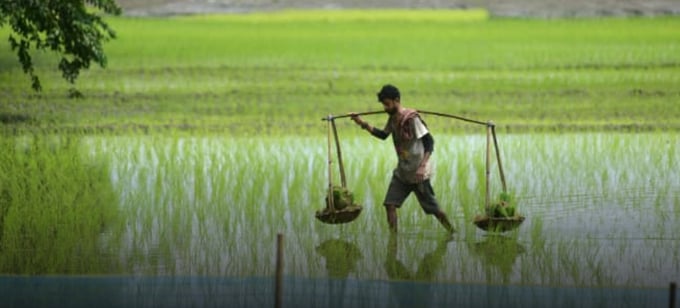November 27, 2025 | 18:52 GMT +7
November 27, 2025 | 18:52 GMT +7
Hotline: 0913.378.918
November 27, 2025 | 18:52 GMT +7
Hotline: 0913.378.918

India’s export ban on rice is reverberating through global rice markets, threatening food security if developing nations cannot afford or access rice.
India’s export ban on rice is reverberating through global rice markets, threatening food security if developing nations cannot afford or access rice.
“The only shortage out there right now would really be India’s plain, white, long grain, poor quality rice that they ship to a lot of countries throughout Africa and Southeast Asia,” Peter Bachmann, vice president of policy and government affairs, told CNBC. “And when they slap a ban in place, that impacted those developing countries the hardest and first.”
First, India banned exports of broken rice and imposed a 20% duty on exports of some rice varieties in September 2022.
Then, in July 2023, India banned exports of its plain, white, long-grain rice.
“India is a country that has suffered from food insecurity in a significant way, so there’s an understandable desire to ensure appropriate availability of staple foods like rice within the country,” Will Kletter, vice president of operations and strategy at ClimateAi, told CNBC.
“But there’s a trade-off to that.”
India’s rice exports make up 40% of the market, so any export bans quickly influence global prices.
Rice prices spiked 15% to 20%, hitting their highest in almost 12 years, according to the International Food Policy Research Institute.
″[India is] trying to secure enough rice in their domestic markets so their prices will drop for consumers,” Bachmann said.
Part of the problem is that despite facing the same rising input costs for energy and fertilizer, in comparison to other agricultural commodities, market prices for rice stayed relatively stable.
U.S. rice farmers face the same volatile rice prices.
“Our farmers, they’ll go up against any rice farmer,” Michael Klein, vice president of communications and domestic promotion at USA Rice, told CNBC. “But, they can’t compete with the foreign government.”
When U.S. rice farms struggled to stay profitable as global rice prices mismatched with rising input costs, Congress passed $250 million in supplemental funding.
“These programs exist just to stop these farmers from falling through the cracks because that would be a huge disaster,” Klein said.
(CNBC)

(VAN) A new study reveals how the simultaneous effects of ocean acidification, salinity and loss of oxygen are making the world more fragile.

(VAN) Hopes are growing that the creation of the first 3D turkey gut model could be a turning point in the battle against the virulent blackhead disease.

(VAN) Tyson, America’s biggest meat supplier, plans to shutter one of its largest beef processing plants as the industry continues to struggle with low cattle supplies and political pressure from Washington.

(VAN) New FAO study shows how digital solutions are empowering farmers and fishers to prevent losses and build resilient agrifood systems.

(VAN) Brazil's COP30 presidency pushed through a compromise climate deal on Saturday that would boost finance for poor nations coping with global warming but that omitted any mention of the fossil fuels driving it.

(VAN) Poultry farmers in the UK have been warned that they could face one of the worst winters yet for bird flu.

(VAN) Prices of main-crop paddy have risen sharply, with jasmine rice hitting 16,100 baht per tonne — the highest level in years.